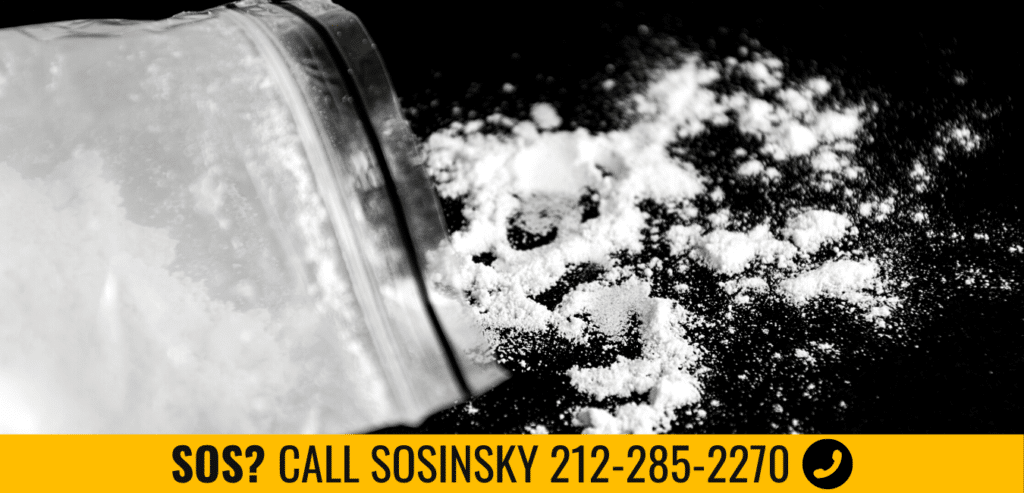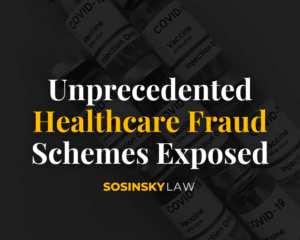NYC Federal Drug Lawyer
Federal Drug Defense Lawyer In New York
The federal government takes narcotics-related crimes very seriously. In fact, with the exception of immigration offenses, most of which occur at our borders, controlled substance prosecutions have for many years made up the largest percentage of federal criminal cases — and convictions. Because most federal drug cases charge violations that carry mandatory minimum sentences even for first-time offenders, the successful defense of these cases requires the utmost in experience, skill, and savvy.
If you or a loved one believes that you are a target of a federal drug investigation or have been arrested in connection with a federal narcotics case, you will want to retain a top-shelf federal criminal defense attorney well-versed in these cases. One who has assisted hundreds of clients in federal controlled substance cases by avoiding charges altogether, obtaining favorable sentences, and winning jury verdicts. NYC federal drug lawyer Fred Sosinsky has done just that over the course of his more than 30 years of practice. From drug couriers flying into JFK to highly regarded physicians under scrutiny for their prescribing practices, from street-corner salesmen to large-scale international traffickers, Fred Sosinsky has represented them all. An exceptional courtroom talent, Fred will work tirelessly to reach the best possible outcome for you.

What are Federal Drug Charges?
While there are many federal statutes that criminalize drug possession, distribution, dispensing, manufacturing, and importing, the most commonly seen federal drug charges are those for possession, possession with intent to distribute, and distribution of various controlled substances. Also frequently charged is the illegal importation of various drugs into the United States. Finally, in any case, in which two or more people are charged with narcotics-related crimes, the crime of conspiracy to commit that controlled substance crime will also be charged.
The federal Controlled Substance Act regulates the manufacture and distribution of all controlled substances such as narcotics, hallucinogens, depressants, stimulants. The Act contains five “Schedules” or categories of controlled substances based on their potential for abuse and addiction, status in international treaties, and possible medical benefits they may provide. The drugs that appear on Schedule I are, at least in theory, those with no accepted medical uses and which have a significant potential for abuse and addiction. Heroin, LSD, ecstasy, and marijuana (notwithstanding recent studies and acceptance in certain jurisdictions for medicinal and recreational purposes) are all found in Schedule I. Schedule II controlled substances generally have some accepted medical applications and a high potentiality for abuse. They include cocaine, a cocaine base or crack, fentanyl, methamphetamine, PCP, morphine, oxycodone, Adderall, and Ritalin. Schedules III through V are drugs that may have valid medical usages in certain circumstances and pose a lesser risk of addiction. These include prescription medications such as Ambien, Xanax, valium, cough medications.
Unlawful Manufacture, Distribution, Dispensing and Possession with Intent to Distribute Controlled Substances
A single federal statute makes it a crime for anyone unless authorized by law, to knowingly or intentionally manufacture, distribute, dispense or possess with intent to manufacture, distribute or dispense a controlled substance. Attempts and conspiracies to commit this crime are treated the same under the law as the crimes which were the object of the attempt or conspiracy.
Conspiracy to Distribute or to Possess With Intent to Distribute Controlled Substances
As noted, in most federal drug prosecutions, a charge of conspiracy with the object being the commission of the underlying substantive controlled substance offense that are brought as well. Critically, however, the crime of conspiracy to commit that drug crime is separate and distinct from the substantive crime. Thus, it is possible that a person could be convicted of a drug conspiracy even though they are found not guilty of the substantive offense — or even if they were not charged with that substantive offense. This is so because the law of conspiracy in the area of drug offenses criminalizes an agreement between two or more people to commit a crime so long as some act is taken towards the commission of that crime.
Importation of Controlled Substances Into the United States
Federal law makes it unlawful for a person to import into the United States or U.S. customs territory any controlled substance in Schedule I or II, or, with a few exceptions, any narcotic drug in Schedule III, IV, or V.
Simple Possession of a Controlled Substance
Under federal law, it is a crime for a person to knowingly or intentionally possess any controlled substance unless the substance was obtained directly from or pursuant to a valid prescription or order from an authorized medical provider. This law also makes it a crime for a person to knowingly or intentionally purchase more than nine grams of ephedrine base, pseudoephedrine base, or phenylpropanolamine base during any thirty (30) day period. If the offender has not previously been convicted of a controlled substance offense, this crime is a misdemeanor punishable by up to one year in federal jail.
Maintaining Drug-Involved Premises
Federal law makes it a crime for a person to knowingly open, lease, rent, use, or maintain any place for the purpose of manufacturing, distribution, or using any controlled substance.
Distribution of Controlled Substances to Those Under Age 21
Federal law provides for enhanced punishment for any person, over the age of 18, who distributes a controlled substance to another person under the age of twenty-one.
Distribution or Manufacturing of Controlled Substances in or Near Schools and Colleges
Federal law provides enhanced punishment for persons who manufacture, distribute or possess with intent to distribute controlled substances in or on or within one thousand feet of a school, college or playground, public housing, or within one hundred feet of a youth center, public swimming pool or video arcade location.
Using Children to Distribute Drugs Near A School or Playground
The law permits three times as harsh a sentence as is otherwise authorized for those persons over the age of 21 who employ, hire, use, persuade or otherwise entice anyone under the age of 18 to distribute drugs near schools or playgrounds or to avoid detection or apprehension for such offense.
Manufacturing, Distributing or Possessing With Intent to Manufacture or Distribute Methamphetamine on Premises Where Children Are Present or Reside
Federal law requires a mandatory consecutive sentence of up to twenty (20) years in federal prison for a person who manufactures, distributes, or possesses with intent to manufacture or distribute methamphetamine on premises in which any person under the age of 18 is present or resides.
Drug Paraphernalia
Under federal law, it is unlawful for a person to sell, offer to sell, import or export, or use the mail or carriers to transport “drug paraphernalia” as that term is defined in law. The definition includes any equipment, product, or material that is primarily intended or designed for use in the manufacturing, producing, processing, ingesting, inhaling, preparing, or otherwise introducing into the human body a controlled substance that is unlawful under federal law.
Continuing Criminal Enterprise
In an effort to punish even more severely the main operators and managers of larger and more ongoing drug organizations, federal law contains a crime entitled “Continuing Criminal Enterprise” which drops the hammer upon those convicted of this offense. Under the Continuing Criminal Enterprise statute, a person violates this crime when he or she engages in a federal controlled substance felony offense, such crime is part of a continuing series of similar crimes, such crimes are committed in concert with five or more other persons with respect to whom such person occupies a position of organizer, supervisor or manager and the crimes provide such person with substantial income or resources. Where these elements are proven, enhanced sentencing for engaging in a CCE will lie.

There Are Defenses for Federal Drug Crimes
While federal drug prosecutions are very serious matters, there may be certain strategies that could prove successful in your defense and lead to the dismissal or reduction of charges.
First, many drug cases involve the forcible stops, searches, and seizures of evidence from persons on the street, vehicles, residences, offices, and storage units. Often enough, police and agents conduct such stops and subsequent searches without probable cause to have made the initial stop of the person or car, or without obtaining a warrant authorizing the search of premises. Sometimes, agents rely upon the alleged voluntary consent of parties to carry out these intrusive measures. In all of these circumstances, constitutional challenges may be brought contesting the right of law enforcement to have made the stop, conducted the search, and seized the evidence sought to be admitted at trial.
Second, even in those cases where a search warrant was obtained, it may be possible to attack the basis for the warrantor to offer evidence that certain information in the warrant application was false. In addition, a challenge to the scope or breadth of the warrantor to the manner of its execution may be advanced.
Third, in almost all narcotics cases, the government relies upon information and evidence provided to them by paid confidential informants or co-conspirators who expect, as a result of their work with law enforcement, to receive substantial benefits such as sentencing reductions. In the hands of a capable and skilled NYC federal drug crime lawyer, these witnesses can be shown to be inherently unreliable and untrustworthy sources whose testimony should be discounted or even disregarded.
Fourth, there are times when the government uses coercive and unjustifiable measures to ensnare or entrap individuals in criminal activity to which they are otherwise resistant. So long as the accused was not previously involved in or predisposed to drug dealing, an entrapment defense may be viable.
Fifth, not everyone who is present when narcotics trafficking is discussed or even carried out can be proven to have intended to promote or support such activities. Presence alone even coupled with the knowledge that others are committing crimes is not sufficient to show that an accused joined a criminal venture. More must be shown than this.
Sixth, sometimes those who were part of a narcotics conspiracy make a decision to leave criminality behind and renounce their participation in the drug business to the others involved. Where this can be shown, a defense of renunciation may be presented.
Seventh, there are cases where a person who transported or stored a package or suitcase may not have known that within the package or suitcase was a quantity of a controlled substance. Under these circumstances, a defense involving a lack of knowledge may prove successful. It bears noting, however, that federal law permits knowledge to be inferred if a person is willfully blind to the likelihood that there were drugs present.
Sentences For Federal Drug Crimes
Sentencing for convictions of federal drug offenses depends first and foremost upon the statute of conviction. Federal law generally contains different minimum and maximum statutory penalties depending upon the nature of the drug in question and the number of such drugs involved. Authorized sentences also depend upon whether serious injury or death occurred in connection with the offense, i.e., in cases with drug overdoses, and whether the offender has previously been convicted of a drug offense. Cases involving certain small amounts of controlled substances may not involve mandatory minimum sentences whereas others may have mandatory minimum sentences of ten or more years even though the quantity is similarly small. Under the law, so long as a mixture of a substance contains a distinct amount of the illicit drug in question, it is the total weight of the mixture regardless of its purity that governs.
For cases involving less than five hundred grams of cocaine or less than five grams of cocaine base or crack cocaine, federal law punishes violations with up to twenty years in prison. There is no mandatory minimum sentence that applies. For cases involving less than five kilograms of cocaine or less than fifty grams of crack cocaine, there is a mandatory minimum of five years and a maximum sentence of forty years in federal prison which applies. For cases involving five kilograms or more of cocaine or fifty grams or more of crack cocaine, a mandatory minimum of ten years and a maximum sentence of life imprisonment applies.
For cases involving less than one hundred grams of heroin, the law provides for up to twenty years in prison upon conviction. There is no mandatory minimum that applies. For cases involving more than one hundred grams but less than one thousand grams of heroin, there is a five-year mandatory minimum and a maximum sentence of forty years that apply. For cases involving one kilogram or more of heroin, a mandatory minimum of ten years and a maximum sentence of life imprisonment applies.
For cases involving fentanyl with quantities of less than forty grams, federal law punishes violations with up to ten years in prison. There is no mandatory minimum for such violations. For cases involving less than four hundred grams of fentanyl, there is a mandatory minimum sentence of five years and a maximum sentence of forty years that apply. For violations involving more than four hundred grams of fentanyl, there is a mandatory minimum sentence of ten years and a maximum sentence of life imprisonment which applies.
For cases involving less than fifty grams of mixtures containing methamphetamine, federal law punishes violations with up to ten years in prison. There is no mandatory minimum for such violations. For cases involving less than five hundred grams of methamphetamine, there is a mandatory minimum sentence of five years and a maximum sentence of forty years in prison that applies. For violations involving more than five hundred grams of methamphetamine, there is a mandatory minimum sentence of ten years and a maximum sentence of life imprisonment which applies.
For federal cases involving marijuana, the penalties upon conviction are as follows: for cases involving up to forty-nine plants or up to mixtures of less than fifty kilograms, there is no mandatory minimum and a maximum sentence of five years in prison; for cases involving more than forty-nine but less than one hundred plants or more than fifty kilograms but less than one hundred kilograms of marijuana, there is no mandatory minimum but the maximum potential sentence increases to up to twenty years in prison; for cases involving more than one-hundred but less than one thousand plants or more than one hundred but less than one thousand kilograms of marijuana, there is a mandatory minimum sentence of five years and a maximum sentence of forty years in prison; and for those cases involving 1000 or more plants or more than 1000 kilograms of marijuana, there is an applicable mandatory minimum sentence of ten years and a maximum sentence of life imprisonment upon conviction.
For most drugs found on Schedule III, there is no mandatory minimum sentence and a maximum sentence of ten years in federal prison. For Schedule IV substances, once again there is no mandatory minimum sentence and a maximum sentence of five years. For drugs found on Schedule V, the maximum sentence authorized is one year in federal jail if the offender has not previously been convicted of a controlled substance offense.
A conviction for engaging in a Continuing Criminal Enterprise carries a mandatory minimum of twenty years in federal prison.
There are obviously many other controlled substances that one may be accused of unlawfully possessing, trafficking, manufacturing, or importing. The relevant statutes which prescribe the applicable minimum or maximum sentences that may be imposed for such violations must be carefully scrutinized and understood.
Like all federal felonies, the actual sentence to be imposed by a court upon conviction for a drug crime will be decided upon after calculation of the applicable advisory federal sentencing guideline. For controlled substance convictions under the guidelines, the primary moving force is the total quantity of drugs for which the defendant is to be held responsible. Federal law does not limit that quantity to that which a person is arrested with, or otherwise possesses. Nor does federal law limit the quantity to that which a person was involved in selling to others if they are part of a larger group that distributed drugs as an ongoing nature. Instead, federal sentencing law generally counts as relevant conduct in all quantities for which the person was involved or reasonably understood his or her co-conspirators to have been involved. After settling on the number of drugs involved, the guidelines also consider such factors as the role the offender played in the offense, the presence of firearms, the use of a location to manufacture, package, or store narcotics, and other similar considerations.
After the suggested sentencing guideline is calculated, the court will consider the defense’s request that a non-jail or, if not possible, a minimum sentence be imposed. Strong advocacy about the history and character of the offender must take place and the circumstances which led to the offense must be adequately addressed. A skilled, passionate plea by defense counsel may, at this stage of the proceedings, make all the difference in the world.
Speak With An NYC Federal Drug Lawyer Today
If you or a loved one have been indicted for a federal narcotics offense, nothing is more important than having a tough, aggressive, and experienced defense counsel on your side. NYC federal drug lawyer Fred Sosinsky has been representing men and women charged with narcotics conspiracies and similar crimes in the federal courts for more than 30 years. Call Fred for a case evaluation today.
SOS? CONTACT SOSINSKY
NYC Criminal Defense

Unprecedented Healthcare Fraud Schemes Exposed
Unprecedented Healthcare Fraud Schemes Exposed: A Glimpse into the Recent DOJ Crackdown In a groundbreaking move, the Department of Justice has unveiled criminal charges against
